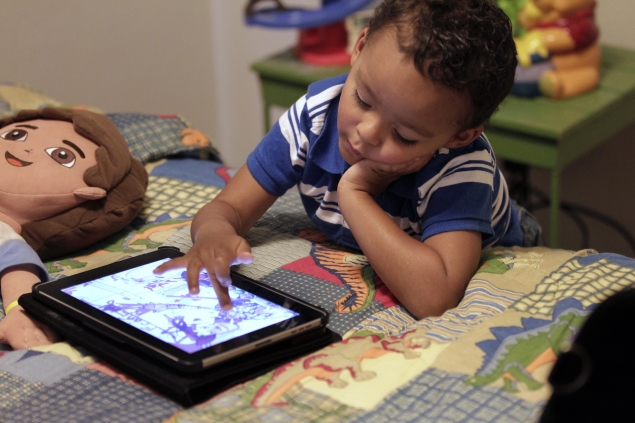'Apps not effective tool for teaching babies'
Advertisement

Smartphones don't make smart babies, an advocacy group declared in a complaint to the government about mobile apps that claim to help babies learn.
The Campaign for a Commercial-Free Childhood, whose allegations against "Baby Einstein" videos eventually led to consumer refunds, is urging federal regulators to examine the marketing practices of Fisher-Price's "Laugh & Learn" mobile apps and Open Solutions' games, such as "Baby Hear and Read" and "Baby First Puzzle."
The Boston-based group said Wednesday that developers are trying to dupe parents into thinking apps are more educational than entertaining. It's the campaign's first complaint to the Federal Trade Commission against the mobile app industry as part of its broader push to hold businesses accountable for marketing claims about their technology to very young children and their parents.
"Everything we know about brain research and child development points away from using screens to educate babies," said Susan Linn, the group's director. "The research shows that machines and screen media are a really ineffective way of teaching a baby language. What babies need for healthy brain development is active play, hands-on creative play and face-to-face" interaction.
The American Academy of Pediatrics discourages any electronic "screen time" for infants and toddlers under 2, while older children should be limited to one to two hours a day. It cites one study that found infant videos can delay language development, and warns that no studies have documented a benefit of early viewing.
Advertisement
In a statement provided to The Associated Press, Open Solutions said it agrees that electronics are not a substitute for human interaction. But it noted the many positive reviews its apps have received by customers.
"We also don't say 'get this game and let it teach your child everything,'" wrote the company, based in Bratislava, Slovakia. "We assume (the) child is playing the game with parent/sister/baby sitter. We think we have apps that can help parents with babies, either by entertaining babies or help them see new things, animals, hear their sounds, etc."
Advertisement
Kathleen Alfano, senior director of child research for Fisher-Price, said in a statement that toy development at the East Aurora, New York-based company begins with extensive research by experts in early childhood development "to create appropriate toys for the ways children play, discover and grow."
"Grounded in 80 years of research and childhood development observations, we have appropriately extended these well-researched play patterns into the digital space," Alfano said.
Advertisement
Linn's group alleges that the companies violate truth-in-advertising laws when they claim to "teach" babies skills. For example, Fisher-Price claims that its Laugh & Learn "Where's Puppy's Nose?" app can teach a baby about body parts and language, while its "Learning Letters Puppy" app educates babies on the alphabet and counting to 10. Open Solutions says its mobile apps offer a "new and innovative form of education" by allowing babies to "practice logic and motor skills."
"Given that there's no evidence that (mobile apps are) beneficial, and some evidence that it may actually be harmful, that's concerning," Linn said.
According to the Pew Internet and American Life Project, more than half of American adults own a smartphone while about one-third of adults own a tablet. With the number of mobile devices on the rise, mobile software applications have become lucrative money makers. Even apps that are downloaded for free will often collect personal information from a consumer that can then be sold to marketers.
Most of the Fisher-Price apps, for example, are free but warn in their privacy policies that "third parties" can collect information about a person's device for possible marketing purposes.
Federal law says advertising can't mislead consumers and, in some cases, must be backed by scientific evidence. In 2012, the FTC - which enforces truth-in-advertising laws - agreed with the Campaign for a Commercial-Free Childhood that the developer of "Your Baby Can Read" lied when it promised consumers it could teach babies as young as 9 months to read. That business shuttered after the FTC imposed a $185 million settlement.
In 2006, the group asked the FTC to prohibit the makers of Baby Einstein and Brainy Baby videos from making claims about educational benefits. The FTC eventually declined to act after the companies, owned by the Walt Disney Co., agreed to remove some marketing promises from its packages and took down testimonials that claimed educational benefits. The Campaign for a Commercial-Free Childhood still pressed a group of lawyers to threaten a class-action lawsuit, and Disney began offering cash refunds for videos purchased.
Linn said her organization targeted Fisher-Price and Open Solutions because their baby apps were among the most popular and because they represented an overall trend of deceptive marketing practices by app developers, both big and small.
Leticia Barr, a former schoolteacher who runs the website Tech Savvy Mama, said apps might be educational but not until a child is much older.
"I think at a certain age, apps can certainly reinforce educational learning in kids," such as working on the alphabet or numbers. "But it's not a substitute for the parent. It's not a substitute for reading. It's not a substitute for the things you do in everyday life."
For the latest tech news and reviews, follow Gadgets 360 on X, Facebook, WhatsApp, Threads and Google News. For the latest videos on gadgets and tech, subscribe to our YouTube channel. If you want to know everything about top influencers, follow our in-house Who'sThat360 on Instagram and YouTube.
Advertisement
